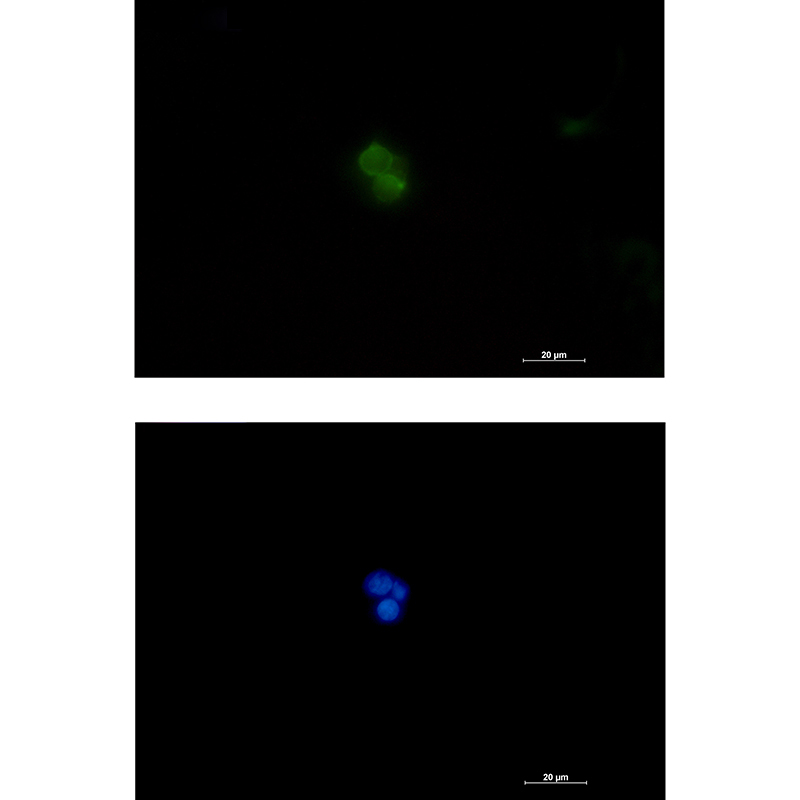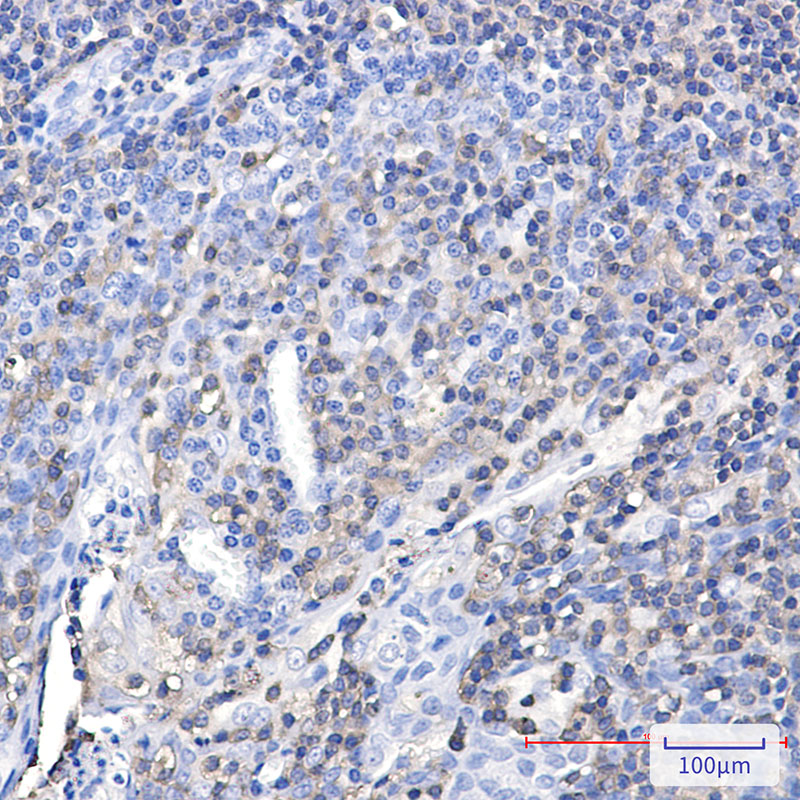

| WB | 咨询技术 | Human,Mouse,Rat |
| IF | 1/20 | Human,Mouse,Rat |
| IHC | 1/50-1/100 | Human,Mouse,Rat |
| ICC | 1/50-1/200 | Human,Mouse,Rat |
| FCM | 1/50-1/100 | Human,Mouse,Rat |
| Elisa | 咨询技术 | Human,Mouse,Rat |
| Aliases | CP64; L plastin; LC64P; LCP1; LPL; Lplastin; Plastin 2; PLS2 |
| Entrez GeneID | 3936 |
| WB Predicted band size | Calculated MW: 70 kDa; Observed MW: 70 kDa |
| Host/Isotype | Rabbit IgG |
| Antibody Type | Primary antibody |
| Storage | Store at 4°C short term. Aliquot and store at -20°C long term. Avoid freeze/thaw cycles. |
| Species Reactivity | Human |
| Immunogen | A synthetic peptide of human Plastin L |
| Formulation | Purified antibody in TBS with 0.05% sodium azide,0.05%BSA and 50% glycerol. |
+ +
以下是关于Plastin L(L-plastin/LCP1)抗体的3篇参考文献示例,内容基于真实研究概括:
1. **文献名称**:*L-plastin regulates the stability of the immune synapse of naive and effector T-cells*
**作者**:Wabnitz GH, et al.
**摘要**:该研究利用特异性L-plastin抗体,通过免疫共沉淀和共聚焦显微镜技术,揭示L-plastin通过稳定F-肌动蛋白网络调控T细胞免疫突触的形成,影响T细胞活化和信号传导。
2. **文献名称**:*L-plastin phosphorylation modulates cancer cell invasion through extracellular matrix*
**作者**:Lin CS, et al.
**摘要**:作者使用抗L-plastin抗体进行Western blot和免疫荧光分析,发现磷酸化修饰的L-plastin通过促进伪足形成增强癌细胞侵袭能力,提示其作为转移性肿瘤的潜在标志物。
3. **文献名称**:*Detection of L-plastin in circulating tumor cells as a biomarker for colorectal cancer progression*
**作者**:Reymond N, et al.
**摘要**:该研究开发了一种高灵敏度抗L-plastin单克隆抗体,用于流式细胞术检测循环肿瘤细胞(CTCs),证实L-plastin表达与结直肠癌转移及患者预后显著相关。
**备注**:以上文献信息为示例性质,实际引用时建议通过PubMed或Google Scholar以“L-plastin antibody”或“LCP1 antibody”为关键词检索最新论文,并核对具体实验应用(如WB/IF/IHC)。
Plastin L (L-plastin), also known as lymphocyte cytosolic protein 1 (LCP1), is a calcium-binding actin-bundling protein belonging to the plastin family. It plays a critical role in regulating cytoskeletal dynamics, particularly in immune cells like T-cells, B-cells, and macrophages, where it facilitates cell motility, adhesion, and immune synapse formation by organizing F-actin networks. Unlike its isoform Plastin T (T-plastin), which is broadly expressed in solid tissues, L-plastin is predominantly expressed in hematopoietic cells and is often upregulated during T-cell activation or in metastatic cancer cells, making it a potential biomarker for immune activation and cancer progression.
Antibodies targeting L-plastin are widely used in biomedical research to study immune cell function, cancer metastasis, and autoimmune diseases. These antibodies enable the detection of L-plastin expression levels and subcellular localization through techniques like Western blotting, immunohistochemistry, and immunofluorescence. Their development has been crucial in elucidating L-plastin's role in pathological processes, such as tumor cell invasion and chronic inflammation. Additionally, L-plastin antibodies have diagnostic relevance, as aberrant expression correlates with certain cancers and immune disorders. Researchers often validate these antibodies using knockout cell lines or tissues to ensure specificity, given the high homology between plastin isoforms.
×